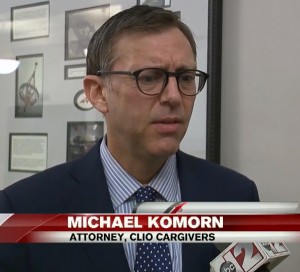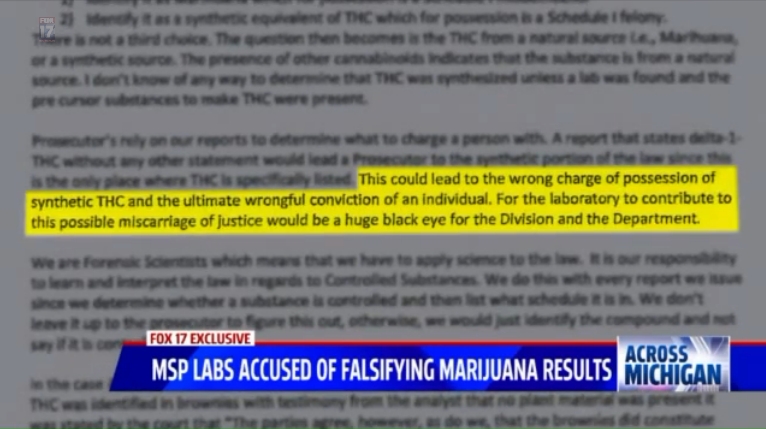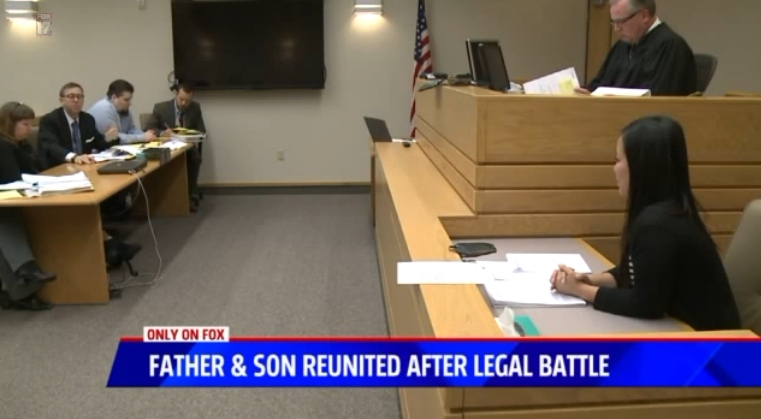
May 4, 2016 | Medical Marijuana Attorney Michael Komorn, News
In July of 2014, the St. Clair County Drug Task Force (DTF) raided the home and business of Annette and Dale Shattuck, a couple who owned a medical marijuana dispensary in Kimball, Michigan.
The Shattucks were at their dispensary, DNA Wellness Center, when DTF agents arrested them, the Washington Post reported. Meanwhile, their four young children were playing at home under the supervision of their grandmother.
“DTF busted in the door that morning, a no-knock, battering ram entry,” reads a briefing filed by the Shattuck’s attorney “During the dynamic entry, armed DTF officers wearing ski masks separated the children from their grandmother at gunpoint, shouting at her to get the dog under control or they would shoot it. The deputies kept the children lined up on the couch at gunpoint, refusing even to remove their masks to help calm the kids, including two three-year-old toddlers.”
[Note: The Shattuck’s Attorney is Michael Komorn. – A well known and highly experienced lawyer for Michigan medical marijuana cases].
A sheriff for the task force told the Washington Post that these claims were a “misrepresentation,” saying there was “no way in hell” officers would point their weapons at children. He did, however, acknowledge that it’s standard practice for officers to draw their weapons in such raids.
Perhaps no story illustrates the confusion surrounding medical marijuana’s legal status better than that of the Shattucks—a couple who went extra lengths to ensure their compliance with state laws.
The Shattucks obtained the necessary permits and licenses from their local planning commission. The landlord of the building where the dispensary was housed gave his permission in the lease. Bill Orr, the chairman of the commission, thanked the Shattucks for “following the ordinance and taking the necessary steps to open the business within Kimball Township in the manner required,” according to court documents.
Annette, a registered caregiver with the state, personally called the DTF and requested an inspection of DNA Wellness to insure that the business complied with state law. But instead of conducting an inspection, the task force decided to send confidential informants into the dispensary to make purchases, which they then used as probable cause for a raid.
Annette and Bill were charged with felony possession with intent to distribute and possession with intent to manufacture marijuana.
The Shattucks’ plight is one of many that show how confusing, patchy medical marijuana laws harm businesses and upend lives. Businesses and caregivers in MMJ-legal states are subject to conflicting signals from different government entities. Even though the federal government does not allow federal funds to be used against cannabis companies operating legally under state laws, the state laws themselves are murky and open to interpretation.
Michigan’s legislature needs to enact clearer laws regulating the cannabis industry—the current law does not address the legality of dispensaries and does not allow for marijuana to be sold from them. The ambiguous rules are not just a problem for those in the marijuana industry:
“The Michigan Supreme Court has spent countless hours adjudicating a total of eight cases involving medical marijuana since the Michigan Medical Marijuana Act was passed in 2008,” reports Downtown magazine.
Supreme Court justices and local governments have pressed the state’s legislature to do something to clarify the laws. But attempts to do so have been stagnant: A trio of medical marijuana bills that have been approved by the House are now languishing in a Senate committee. One of them would establish a licensing system for retailers, growers and distributors.
Meanwhile, 53 percent of voters say they would approve a ballot initiative to completely legalize and tax marijuana, according to a recent poll.
While voters want the plant to be legal and regulated, lawmakers seem not to be prioritizing the issue, putting patients, caregivers and business owners at the mercy of an arbitrary system.
A judge recently threw out the charges against the Shattucks, ruling that the government can’t prosecute you for a “crime” that another arm of the government approved. But unfortunately for the family, the consequences still linger.
Their 10-year-old daughter has been in counseling for more than a year to deal with the trauma as a result of the raid. The DTF has not returned all of their property, and the property that has been returned is damaged. The couple continues to struggle with the burden of legal fees and finding work—though charges have been dropped.
In the absence of federal progress on marijuana policy, states with any sort of legal cannabis, have a duty to responsibly regulate the industry. Whether they have passed useless CBD legislation or have voter referendums, too many states are sitting idly by as local jurisdictions and individuals try to navigate the haphazard laws, sometimes—as in the case of the Shattuck family—with ruinous results.
By Mona Zhang · Mon Apr 04, 2016

Apr 27, 2016 | Criminal Defense Attorney Michael Komorn, News
CLIO (WJRT) – (04/25/16) – A Mid-Michigan marihuana dispensary is fighting the Genesee County Prosecutor’s office in court after FANG shut them down.
The owner of the Clio dispensary says warrants weren’t valid and he wants his business back open.
Attorneys from both sides were in Judge Hayman’s court Monday afternoon. The raid happened in January when the Genesee County Prosecutor’s office filed an emergency injunction to close down a facility called Clio Caregiver Connection.
A counter claim was filed against the Prosecutor’s Office, saying the county failed to meet legal requirements to participate with FANG.
The defense also argues that the recent dispensary raids and padlocking efforts by FANG were and are illegal.
“I don’t write the laws. I just enforce them. Dispensaries are not allowed. The word dispensary does not even appear in the medical marihuana act,” said Prosecuting Attorney David Leyton.
“There’s never been any complaints from anyone. He’s loved by all of the patients that’ve gone in there. They’re all unhappy that this was forced down. And it’s just an overreach by FANG,” said Clio Caregiver Connection Attorney Michael Komorn.

The case is in its early stages. Both sides will return to court to discuss it again on May 16.
By: Caresse Jackman – Updated: Tue 1:27 PM, Apr 26, 2016
Watch the Report

Apr 21, 2016 | Legalization, News
Canada to introduce legislation in 2017 to legalize marijuana
OTTAWA — The Canadian government announced Wednesday that it will introduce legislation next year to decriminalize and legalize the sale of marijuana, making Canada the first G7 country to permit widespread use of the substance.
The announcement was made by Canada’s health minister, Jane Philpott, at a U.N. drug conference in New York. It follows through on a promise made during Prime Minister Justin Trudeau’s successful election campaign last fall.
Philpott said details of the legislation are being worked out, but she vowed that the government “will keep marijuana out of the hands of children and profits out of the hands of criminals.”
With the Liberals holding a majority in the House of Commons, the marijuana legislation is likely to pass. The path toward the legalization of marijuana is the latest in a string of policy announcements from the 44-year-old Trudeau that have moved Canada to the left after a decade of Conservative Party rule, including last week’s unveiling of legislation to permit assisted suicide.
Trudeau, whose new government remains extremely popular, has long been associated with the marijuana legalization issue. While an opposition party member in Parliament, Trudeau admitted to occasional use of marijuana. “I think it’s five or six times that I’ve taken a puff. It’s not my thing,” he told reporters at the time.
The Conservative Party attempted to use that statement as proof that Trudeau was a political lightweight and a pothead. In the 2015 election, the Conservatives ran ads in ethnic newspapers falsely alleging that Trudeau backed the sale of marijuana to children.
The attack ads failed, in part because most Canadians no longer see the legalization of marijuana as a problem. A recent survey by Nanos Research, an Ottawa public opinion firm, showed that 68 percent of Canadians “support” or “somewhat support” legalizing marijuana and only 30 percent are opposed.
The population is more divided when it comes to allowing Canadians to grow marijuana at home, and about 50 percent of respondents said that they expect legalization to lead to more usage by those younger than 21.
Unlike in the United States, where marijuana regulation is shared by the states and the federal government, in Canada the issue falls almost solely under federal jurisdiction. Marijuana use has been expanding since a court ruling in 2000 allowed Canadians to possess and grow small amounts for medicinal reasons.
Full legalization will make pot available in a way similar to alcohol. That could encourage Americans, particularly those in border areas, to pop over for a puff or two.
Already, Ontario’s provincial premier, Kathleen Wynne, has volunteered that the provincially owned liquor monopoly would be happy to sell the drug. Canada’s major drugstore chains have said that they would like to get in on the business, too.
After several court rulings, commercial marijuana operations have sprouted across the country. Although currently limited to medicinal sales, the companies have been keenly anticipating legalization allowing for widespread use.
One study by a leading Canadian bank estimated that legalization could spark development of an annual marijuana trade worth about $10 billion Canadian (about $8 billion U.S.).
Brendan Kennedy, president of Privateer Holdings of Seattle, welcomed the Canadian announcement. His company owns Tilray, a medicinal marijuana facility in British Columbia, and he is looking to build a facility that would supply the market for recreational marijuana in Canada.
“The eyes of the world are on Canada as the medical marijuana program matures and the recreational program is being implemented,” he said in an interview. “Canada will be the first G7 country to have a national recreational program different from Alaska, Colorado, Oregon and Washington,” where state laws allowing marijuana use still bump up against U.S. federal prohibition.
There is still a series of negotiations required between the national government and the provinces to figure out regulation, taxation and distribution. Trudeau’s point man on the issue is Bill Blair, a former Toronto police chief.
Blair said marijuana should be treated like such intoxicants as alcohol. “We control who it’s sold to, when it’s sold and how it’s used. And organized crime doesn’t have the opportunity to profit from it.”

Original Post By Alan Freeman April 20 at 4:03 PM
https://www.washingtonpost.com/world/the_americas/canada-to-introduce-legislation-in-2017-to-legalize-sale-of-marijuana/2016/04/20/85d375a0-0715-11e6-bfed-ef65dff5970d_story.html

Apr 10, 2016 | Blog, Marijuana Criminal Defense Attorney Michael Komorn, News, Recent Victories
Michigan’s NORML chapter awarded some of the state’s most prominent and outspoken advocates for marijuana law reform during the organization’s Quarterly Meeting held on April 1.
MINORML issues these awards annually, and some are named for activists who have passed away.
Legislator of the Year Award went to Rep. Jeff Irwin (D-Ann Arbor). Rep. Irwin has advocated on behalf of sensible policies and has authored bills on forfeiture reform and marijuana law reform. The Renee Emery Wolfe Activist Award was given to Kevin McCaffery, a Board member of the MILegalize group and a steadfast ally in legalizing cannabis.
A new award, the Gaitwood Galbraith Attorney of the Year Award, was given to criminal defense attorney Michael Komorn. In addition to numerous courtroom victories, Komorn Law uncovered a scandal with scientific reporting of cannabis evidence by the Michigan State Police Crime Lab. Also new: the John Dewitte Evans Veterans Award, given for the very first time to Dakota Serna. Serna has traveled the country advocating for veterans and the use of medical marijuana.
The difficulties of starting a chapter in Michigan’s Upper Peninsula have seemingly been overcome by a group of diehards called the Marquette Work Group, and they were awarded the Gregory Scott Piasecki Work-Group/Chapter Award.
Activist and all-around great guy, Archie Kiel, was given the 420 Award. Outstanding Achievement Awards were given to MILegalize Chair Jeff Hank, Robin Puckett of Jackson NORML, and rising star Colin MacDougall.
The meeting was held at the Eagles Club in Ypsilanti on the afternoon before the Hash Bash and Monroe Street Fairs. Approx. 100 people attended the meeting, where the NORML chapter announces finances and allows anyone to address the Board with suggestions, praise or grievances. An auction held afterward featured a signed Detroit Tigers baseball, a magazine autographed by Tommy Chong, posters and clothing and artwork.
The big winner of the evening was Tom Gillies. A member of the Deaf Power Cannabis group, he won the ultimate High Times Medical Cannabis Cup prize package. Tom and a guest will be given VIP passes and a two-night stay at an area hotel during the annual Cup event in Clio on June 11 and 12. Michigan NORML provided a sign language interpreter for the meeting.
MINORML’s entire release is reproduced below.
The National Organization for the Reform of Marijuana Laws
P.O. Box 2293 ~ Kalamazoo, MI 49003
Michigan NORML would like to take this opportunity to thank all the award winners for their outstanding service to the cannabis community in 2015!
We would also like to thank everyone who contributed or made extraordinary contributions to cannabis reform who were not recognized!
We could have given out a thousand awards this year because our community is very active and so many individuals have demonstrated dedication to this cause. We thank all of you and we hope that next year, one of our awards will have your name on it!
Legislator of the Year
Rep. Jeff Irwin
Gaitwood Galbraith Attorney of the Year Award
Michael Komorn
Gregory Scott Piasecki Work-Group/Chapter Award
Marquette Work Group
Renee Emery Wolfe Activist Award
Kevin McCaffery
John Dewitte Evans Veterans Award
Dakota Serna
420 Award
Archie Kiel
Outstanding Achievement Awards
Jeff Hank
Robin Puckett
Colin MacDougall
The Michigan NORML Board of Directors
Executive Director Matthew Abel
Assistant Executive Director Steven Sharpe
Treasurer Annette Crocker
Secretary Rick Thompson
Chapter Director Trena Moss
Medical Director Dr. David Crocker
Promotions Director Adam L. Brook
Membership Director Brad Forrester
Outreach Director Josef White
Source: The Compassion Chronicles
Rick Thompson was the Editor in Chief for the entire 2-year run of the Michigan Medical Marijuana Magazine, was the spokesman for the Michigan Association of Compassion Centers and is the current Editor and Lead Blogger for The Compassion Chronicles. Rick has addressed committees in both the House and Senate, has authored over 200 articles on marijuana and is a professional photographer. He can be reached at: 4mrick@gmail.com

Apr 8, 2016 | Blog, Criminal Defense Attorney Michael Komorn, Medical Marijuana Attorney Michael Komorn, News, Victories Project
SPRING LAKE, Mich. — After 18 months, a Spring Lake family’s son is out of foster care and reunited with his parents. Yet the fight to be together, through court battles and serious drug charges despite being card-carrying medical marijuana patients, still haunts them.

Thursday, Max Lorincz’s son Dante, 6, picked out his favorite toys from a basket in the family’s living room, handing one to FOX 17 saying, “this is my dad’s favorite.”
Piece by piece, Max and his family are putting their lives back together.

“It’s like 100 pounds being lifted off my chest,” Lorincz said. “It’s like our entire life was put on hold the entire time he was gone.”
Dante was ripped away from the couple after Max was charged with a felony for possession of “synthetic THC.” Between family and criminal court cases, it’s an experience they call hellish.
“It’s not something I’d wish on my worst enemy, the experience we went through,” Lorincz said.
“[Dante] is 6 now, almost 7, you know he’s his own little person at this point. But before, he was just coming into his own, and we missed that entire portion of his life.”
It is a bizarre case FOX 17 first uncovered: the judge handling the criminal case ultimately threw out the charge 16 months later.
September 2014 it all started when police found a thumbprint of hash oil at Lorincz’s home during an unrelated medical emergency. That lead to a felony charge for a charge the judge later ruled unfounded: possession of “synthetic THC.”

A previous, now controversial Michigan State Police policy change in the state’s crime labs requires forensic scientists to write “origin unknown” when testing marijuana without plant matter visible.
Fast-forward 16 months, a judge drops Lorincz’s felony. But the court battles continued in family court for Lorincz and his wife to regain custody of Dante for another two months against Bethany Christian Services.
Only FOX 17 cameras were in court for several permanency planning review hearings including last November during this exchange between Lorincz’s Attorney Michael Komorn and the Bethany Christian Services caseworker:

“What is it, other than [Lorincz’s] use of marijuana, that creates bad parenting?” asked Komorn of the caseworker.
She testified, “Marijuana is a psychoactive substance, and being under the influence doesn’t allow you to be in the most clear mind for your child.”
This woman was the third of five total caseworkers now in the 18-month family court case representing Bethany Christian Services. The agency threatened to petition for permanent removal of Dante from his parents.
In this November hearing, the judge already allowed Lorincz, a legal card holder, to continue use of medical marijuana. The caseworker here on the stand testified that marijuana, even legally used for medical conditions, may make an unfit parent. This was a sticking point in many of these permanency planning review hearings, but ultimately she testified BCS had no evidence to prove drug abuse.
Komorn continued to ask her, “One of the reasons for you to recommend the permanent removal is because of drug substance issues, am I right?”
To which the caseworker said, “Yes.” Komorn continued with, “Ok, and we’ve already clarified that there are no drug substance issues at all regarding my client [Lorincz], am I right?”
She testified, “Yes, yes.”
Now, weeks later, another slap in the face for the Lorincz family: a billboard popping up several blocks from their home on 144th Avenue, with the face of Attorney Chris Wirth, who advocated for their son, working against them in their custody fight.

Lorincz and his family are moving on, but he continues to call for clarified medical marijuana patient rights in Michigan, for the medicine he says saved his life.
“2009 when he [Dante] was being born, he was born in Butterworth Hospital, I was dying of liver failure in Blodgett Hospital across town. It was due to my doctor prescribing too much medication,” Lorincz said.
And the 18 months Lorincz spent legally removed from his son, he reminded, they will never get back.
“We’ll try and make as many positive memories as we can to make up the gap,” Lorincz said. “But there’s definitely nothing that’ll replace the time that we lost, that’s for sure.”
The Lorincz’s have started this GoFundMe page, asking for any help to cover their expenses at this time.

Apr 5, 2016 | Legalization, News
DOWNTOWN PUBLICATIONS – BIRMINGHAM
By Katie Deska News staff
03/31/2016 – Approaching the eighth anniversary of the Michigan Medical Marijuana Act (MMMA), overwhelmingly approved by Michigan voters, the current political battle over cannabis centers not so much on whether or not the state should legalize recreational marijuana, but rather, it poses the question of when legalization will take effect, and who will control and profit from the million dollar industry. Fighting to appear on Michigan’s November 2016 ballot are three initiatives, each outlining a distinctly different approach to legalized recreational marijuana. At press time, only MILegalize and Abrogate Prohibition Michigan, two of the three groups that come from opposing schools of thought, were reaching out for support from the public and actively circulating petitions. The capital of the U.S., and four states – Oregon, Alaska, Washington, and Colorado – have already legalized marijuana for recreational use. Additionally, multiple cities around the country have passed ordinances decriminalizing the substance, effectively diluting the penalty of possession from a misdemeanor or felony, to a civil infraction. Ann Arbor was the first city in Michigan to decriminalize it in 1972. More than 30 years later, following the 2008 passage of the MMMA, an additional 17 municipalities followed suit, each crafting their own ordinance that defines the amount of marijuana to be in the bracket of civil infraction. Seven cities within Oakland County did so, namely, Huntington Woods, Pleasant Ridge, Berkley, Ferndale, Keego Harbor, Hazel Park, and Oak Park. Other areas in Michigan with decriminalization ordinances on the books include Detroit, Lansing, East Lansing, Grand Rapids, and Flint.
Despite growing acceptance of studies illustrating the effects of marijuana as a medical treatment, and increasing social approval of recreational use, the federal government maintains its classification of marijuana as a Schedule I controlled substance, a category defined by the drug enforcement agency as “the most dangerous class of drugs with a high potential for abuse and potentially severe psychological and/or physical dependence.” Heroin, LSD, ecstasy and peyote are listed next to cannabis. Comparatively, the second most dangerous category, Schedule II, includes cocaine, methamphetamine, Adderall, Ritalin, and Vicodin. “I certainly think it (marijuana) ought to be rescheduled,” said former Attorney General Eric Holder in an interview with P.B.S., recorded last September and released in February. “You know, we treat marijuana in the same way that we treat heroin now, and that clearly is not appropriate. So at a minimum, I think congress needs to do that. Then, I think we need to look at what happens in Colorado and what happens in Washington,” referring to two states that have profited immensely from legalized marijuana.
“In June, recreational marijuana sales hit $50 million for the first time, then in July sales rose over $55 million. If you add in medical marijuana sales, the total comes to $96 million for July, also higher than June’s total of $85 million. The portion of these sales in July that is earmarked for school construction projects is $3 million,” wrote Debra Borchardt in Forbes Magazine last fall of Colorado sales. Colorado voters approved recreational marijuana in 2012, the same year as Washington. “According to the Colorado Department of Revenue,” Borchardt’s article read, “the state has received nearly $70 million in tax revenue from marijuana from July 1, 2014 through June 30, 2015, easily beating the nearly $42 million in taxes on alcohol.”
Read the rest here
http://www.downtownpublications.com/1editorialbody.lasso?-token.folder=comm/2016/03/31&-token.story=222983.112113&-nothing&-token.disearea=2













